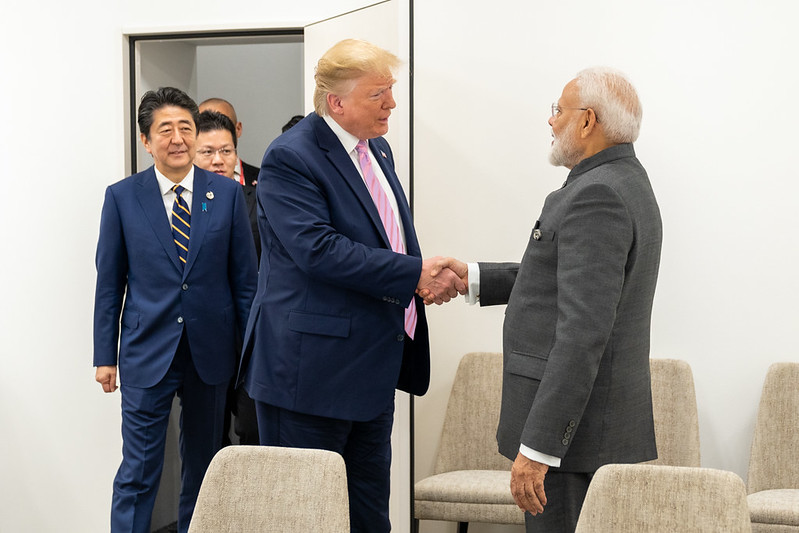Proliferated Nuclear Ethics
In recent years, there has been a creeping acceptance of the proliferation of nuclear weapons. It's time to restart the debate about the morality of nuclear weapons.

Published by The Lawfare Institute
in Cooperation With

Nuclear weapons terrified even George Kennan, the ice-blooded U.S. diplomat and Cold War strategist, who said in 1977, “No one is good enough, wise enough, steady enough, to have control over the volume of explosives that now rest in the hands of this country.”
Yet in recent years, there has been a creeping acceptance of the proliferation of nuclear weapons. Pakistan and Russia claim them as a more or less legitimate way to deter conventional military threats. At a campaign rally in April 2019—just a few months after an attack by a Pakistan-backed terrorist group led to retaliatory Indian air strikes on Pakistani soil—Narendra Modi, India’s prime minister, blustered, “Every other day they [Pakistan] used to say, ‘We’ve nuclear button, we’ve nuclear button.’ ... What do we have then? Have we kept it for Diwali?” While campaigning for president in March 2016, Donald Trump dismissively said that nuclear proliferation is “going to happen whether we like it or not” and added that “if Japan had that nuclear threat, I’m not sure that would be a bad thing for us.”
This ongoing legitimization of nuclear weapons has not always been the settled rule. In the 1980s, leading political theorists and legal scholars including Michael Walzer, Jeff McMahan, Henry Shue and Joseph Nye Jr. (an international relations scholar with a long-standing interest in normative questions) had incisive debates about the morality of nuclear weapons.
As Walzer and others warned, the use of high-yield nuclear weapons would violate at least two cardinal principles of jus in bello, the moral and legal rules of war-fighting: discrimination between military and civilian targets, since such bombs would slaughter enormous numbers of civilians; and proportionality, since annihilating cities makes little sense as a proportional response. Much of this debate concentrated on nuclear deterrence, as scholars asked how to balance the legitimate requirements of self-defense against the prospect of incinerating vast numbers of innocent civilians.
These Cold War debates fizzled out after the collapse of the Soviet empire. Yet today, in a world of nine nuclear-armed states, nuclear proliferation has renewed the urgency of many of the same hard questions. Which governments deserve to possess such weapons? Who, if anyone, could be trusted with such destructive power?
I hope to restart the debate about the morality of nuclear weapons in a new article in Ethics. The article is meant first of all to show that it’s worth taking seriously arguments about nuclear proliferation as moral arguments. It’s high-handed and counterproductive to ignore the moral claims made by leaders or thinkers in China, India, Pakistan, Israel and elsewhere.
But substantively, most of the moral arguments for nuclear proliferation are bad ones. From India to Israel, my article identifies a persistent series of six normative justifications offered for nuclear proliferation: an argument about consistency (if one country can have nuclear weapons, so can others), an argument about nationalism (getting nuclear weapons demonstrates national greatness or technological prowess), an argument about democratic legitimacy (democratic countries are more trustworthy with nuclear weapons than unconstrained dictatorships), an argument about self-defense (states are entitled under the U.N. Charter to defend their political sovereignty and territorial independence from armed attack, and nuclear weapons are an effective way of doing so), an argument about peaceful effects (nuclear deterrence is so potent that it can halt stubborn international quarrels or maybe even abolish war outright), and an argument about supreme emergency (states may be allowed to temporarily use otherwise immoral means when facing an overwhelming threat to liberal civilization).
Yet all of these arguments either fail outright or are significantly flawed. Take the argument about democratic legitimacy. Americans, Indians and Britons often suggest that democracies make better custodians of atomic military power than dictatorships. This follows a long Kantian tradition of seeing republics as distinctive in their foreign policy. The thinking goes that democratic publics are more peaceful, or checks and balances restrain democratic governments from aggression. And when democratic leaders have plunged into disastrous wars, they have often paid a political price: Anthony Eden in Egypt, Pierre Mendès-France in Algeria, Lyndon Johnson in Vietnam, or Menachem Begin in Lebanon.
Yet nuclear weapons undercut many of the institutional advantages of democracy. This weaponry forces fast decisions about retaliatory strikes, which in turn forces swift decisions about preemptive strikes. If a democracy fights a nuclear war, it could hardly do so with the transparency, deliberative procedures, and public accountability ordinarily required in the moral justification of a just war. Anyway, even in conflicts not involving nuclear weapons, Congress has often retreated from restraining war-making U.S.presidents. Curtis Bradley and Jack Goldsmith recount dozens of instances of Congress authorizing the use of force going back to the 1790s, while Harold Koh warned that the executive has been avoiding legislative constraints in foreign policy since Vietnam. When wielding the most lethal weapons in history, Donald Trump or Narendra Modi could be almost as unchecked as Vladimir Putin or Xi Jinping.
Finally, the moral case against the spread of nuclear weapons also calls into question the arguments for retaining the nuclear arsenals inherited from World War II and the Cold War. If many of the moral arguments for getting more nuclear weapons are weak, so are those for keeping them. In much of the world, citizens take for granted the possession of the ultimate weapons as leverage for ordinary political disputes. Rather than accepting the acquisition and ongoing possession of nuclear weaponry by reckless or unaccountable governments, we need better standards for more responsible nuclear policy.




